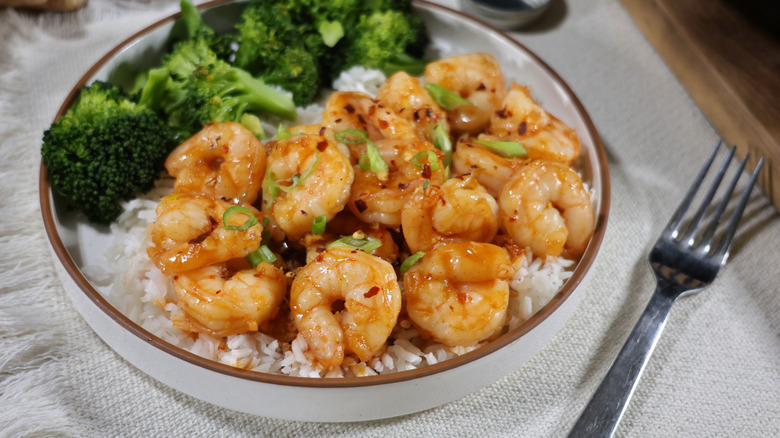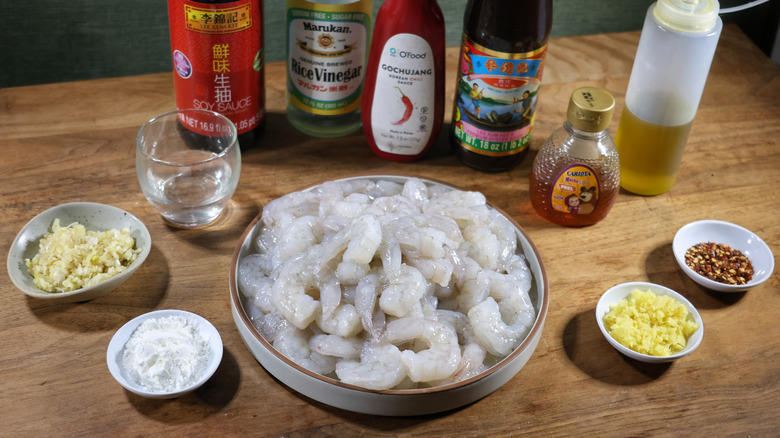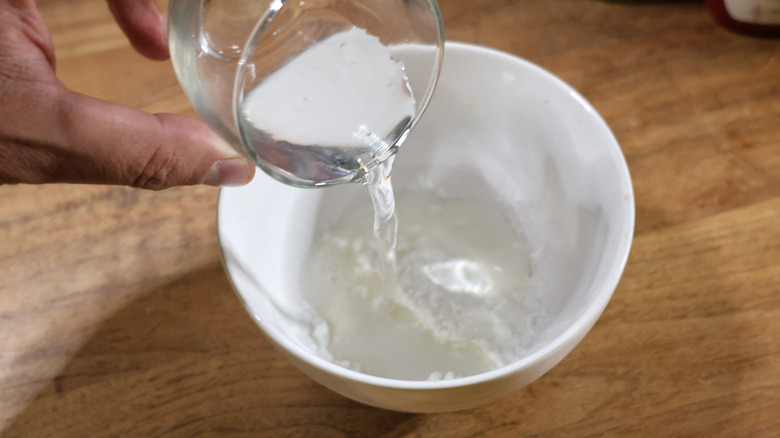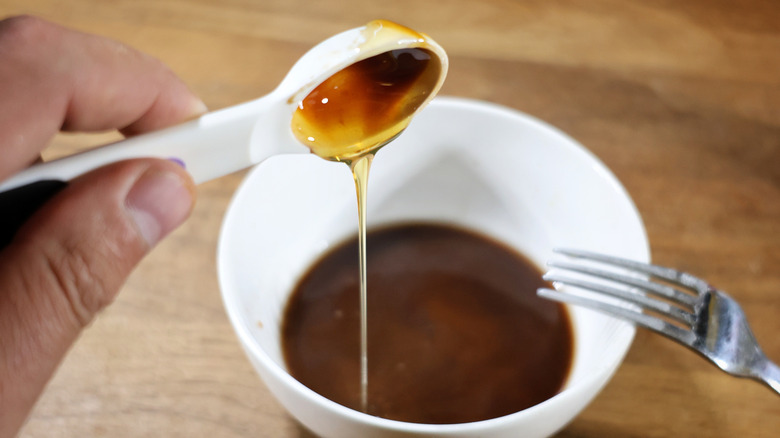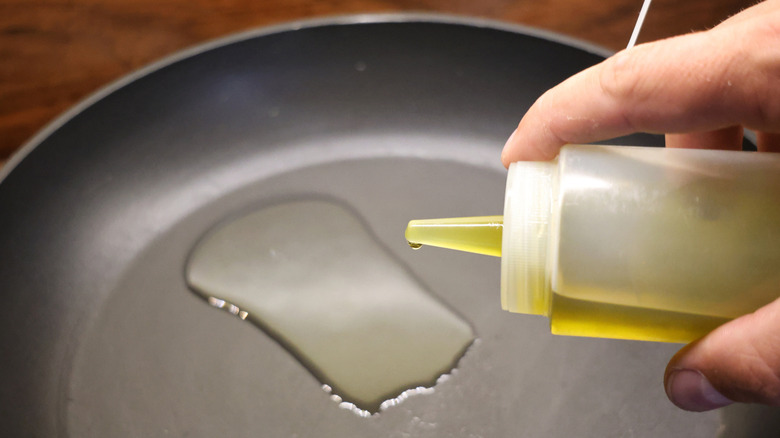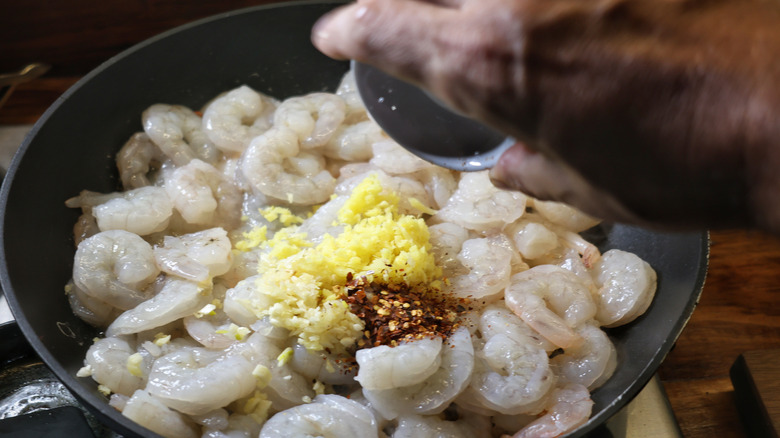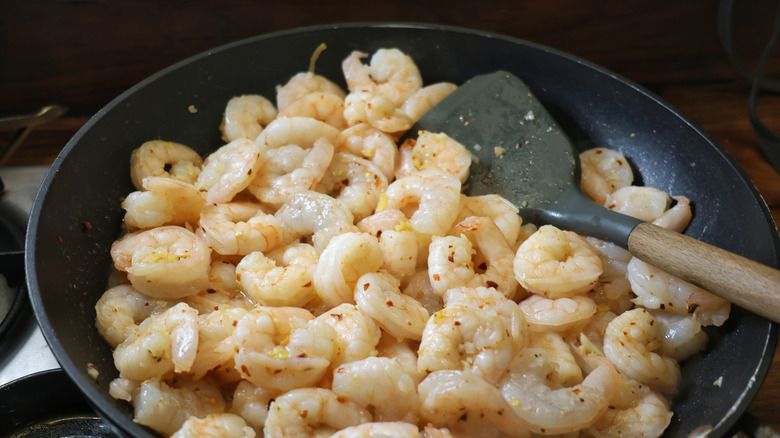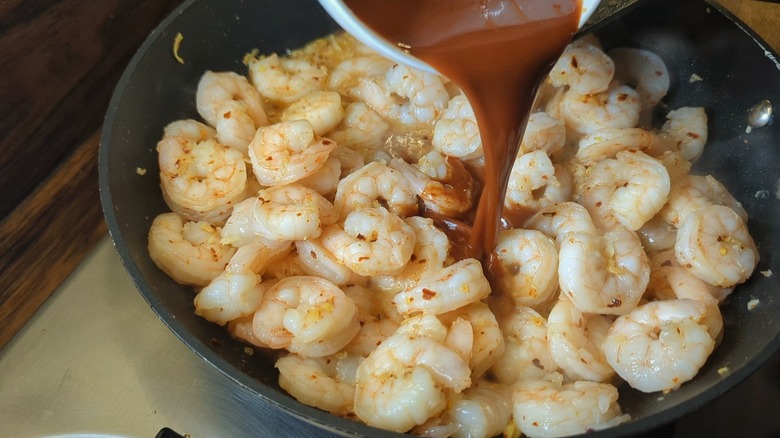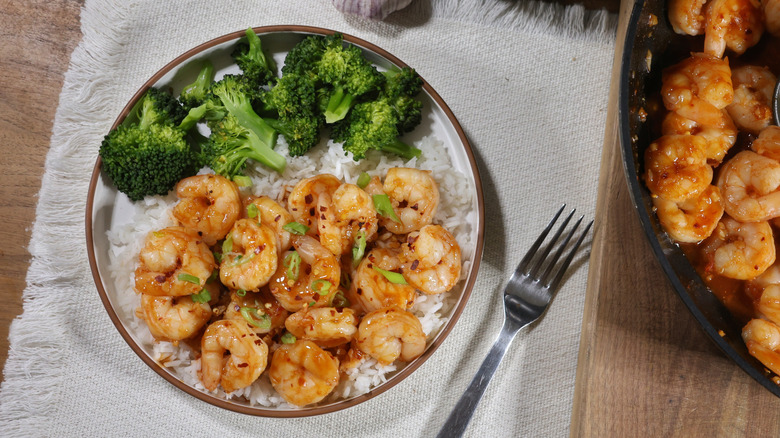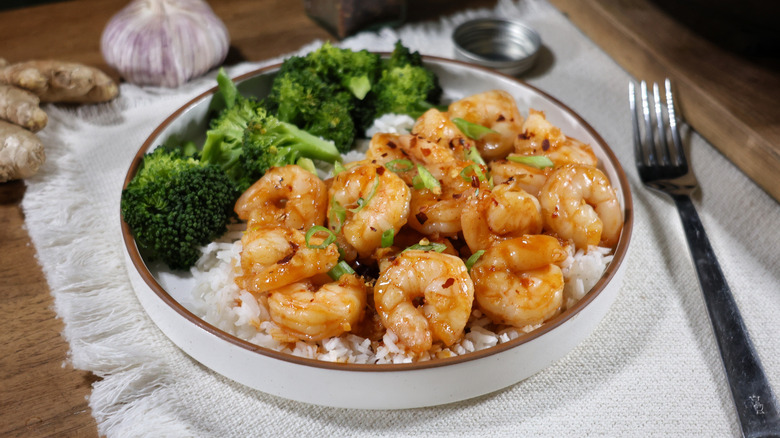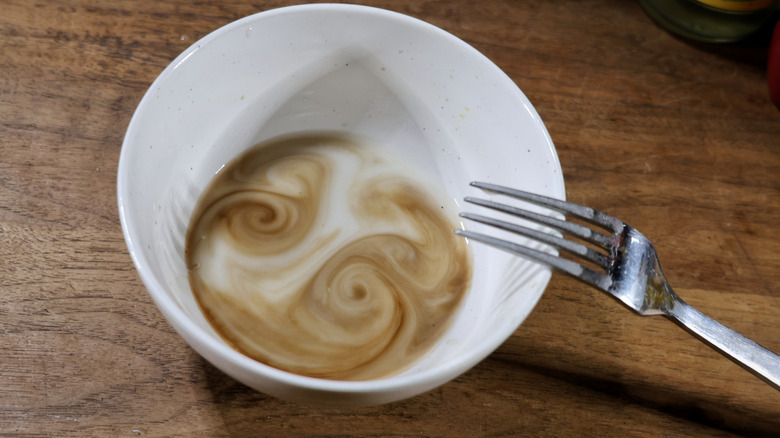Shrimp With Spicy Honey Garlic Sauce Recipe
With a strong balance of punchy flavors — sweet, spicy, salty, umami — this simple honey garlic shrimp can leap from your freezer to the dinner table in less time than it would take to pick up takeout. All you have to do is saute the shrimp and aromatics until they're pink and perfect, then slosh in a commanding mixture of honey, gochujang, soy, and oyster sauce. The result? A quick and easy homemade meal that's far superior to counter service.
This recipe uses shrimp, a popular protein that's relatively inexpensive, mild and sweet in flavor, and perfect for weeknight and last-minute meals. And it's totally fine to use frozen. When you buy "fresh" shrimp at the grocery store, odds are they've been frozen and unfrozen, anyway. In fact, "fresh is best" is probably one of the biggest falsehoods about shrimp.
So even if you don't go out and buy all the ingredients to make this recipe as soon as you finish reading it (though that sounds like a good plan), bookmark it for later. Pick up a bag of frozen shrimp and a couple of bottles of sauce next time you're at the store, and you'll have an exciting, sweet, spicy, savory meal lined up next time you need it.
Gather the spicy honey garlic shrimp ingredients
For the sauce in this recipe, you will need cornstarch, water, gochujang, honey, soy sauce, oyster sauce, and rice vinegar. For the shrimp, you will need large peeled shrimp (duh), vegetable oil, minced garlic, minced ginger, and crushed red pepper. Once you have these ingredients together, you're ready to begin cooking.
Step 1: Make a cornstarch slurry
In a small bowl, make a slurry with the cornstarch and water.
Step 2: Finish the sauce
Add the remaining sauce ingredients to the bowl, and stir to mix. Set it aside for now.
Step 3: Heat the pan
Bring a large skillet to high heat and add the oil.
Step 4: Add the shrimp
Add the shrimp, garlic, ginger, and crushed red pepper to the pan.
Step 5: Cook the shrimp
Cook it for around 4 minutes, tossing regularly, until the shrimp are just cooked (pink and opaque).
Step 6: Pour in the sauce
Give the sauce a quick stir, then pour it into the pan. Cook, tossing regularly, until the sauce is thickened (approximately 2 minutes). Remove it from the heat.
Step 7: Garnish and serve
Serve over rice and garnish with scallions and additional crushed red pepper, if desired.
Pairs well with honey garlic shrimp
Shrimp With Spicy Honey Garlic Sauce Recipe
Get this quick and easy honey garlic shrimp stir-fry on the table in under half an hour for a sweet and spicy meal that's perfect for busy weeknights.
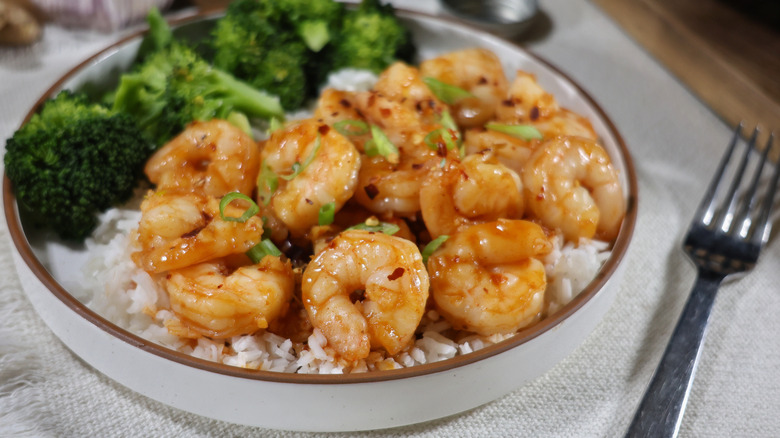
Ingredients
- For the sauce
- 1 tablespoon cornstarch
- 1 tablespoon water
- 2 tablespoons gochujang
- 2 tablespoons honey
- 1 tablespoon soy sauce
- 1 tablespoon oyster sauce
- 2 teaspoons rice vinegar
- For the shrimp
- 2 tablespoons vegetable oil
- 2 pounds large shrimp, peeled
- 2 tablespoons minced garlic
- 1 tablespoon minced ginger
- 2 teaspoons crushed red pepper
Optional Ingredients
- Rice, for serving
- Thinly sliced scallions, for garnish
- Additional crushed red pepper, for garnish
Directions
- In a small bowl, make a slurry with the cornstarch and water.
- Add the remaining sauce ingredients to the bowl, and stir to mix. Set it aside for now.
- Bring a large skillet to high heat and add the oil.
- Add the shrimp, garlic, ginger, and crushed red pepper to the pan.
- Cook it for around 4 minutes, tossing regularly, until the shrimp are just cooked (pink and opaque).
- Give the sauce a quick stir, then pour it into the pan. Cook, tossing regularly, until the sauce is thickened (approximately 2 minutes). Remove it from the heat.
- Serve over rice and garnish with scallions and additional crushed red pepper, if desired.
Nutrition
| Calories per Serving | 326 |
| Total Fat | 8.9 g |
| Saturated Fat | 0.8 g |
| Trans Fat | 0.1 g |
| Cholesterol | 365.1 mg |
| Total Carbohydrates | 15.5 g |
| Dietary Fiber | 0.9 g |
| Total Sugars | 9.3 g |
| Sodium | 934.9 mg |
| Protein | 47.5 g |
What can I substitute for gochujang in this shrimp recipe?
If you've never tried it, gochujang is a fermented paste of gochugaru (Korean chili powder), soybeans, and glutinous rice that is a staple in Korean kitchens. It has a mild sweetness, deep umami, and a healthy kick of heat. Unlike many other spicy ingredients, it doesn't just add heat. It also adds layers of deep flavor. Because of this, there are no perfect substitutes for gochujang. But there are some ingredients that will do in a pinch.
If you're looking for a bottled substitute, Sriracha makes a decent swap. While the flavor profiles are quite different, both the Thai condiment and the Korean paste have well-rounded notes with plenty of heat, sweet, and umami. In the case of Sriracha, this umami is derived from garlic and the sweetness from sugar (rather than the fermented ingredients of gochujang), so the flavor is quite different. That said, it can fill in if you need it to.
Another option that works out alright as a substitute is a combination of tomato paste, soy sauce, and cayenne pepper. You will need to play with the ratios to get it just right, but this combination packs all the same basic flavors as gochujang: tomato paste provides umami sweetness, soy sauce is salty and umami, and cayenne pepper brings the heat. This one might ask a bit of experimentation and creativity, but it'll deliver what you need.
What is the purpose of the cornstarch in stir-fry sauce?
A really good stir-fry starts and ends with the sauce. Whatever proteins and vegetables you toss in the dish are, of course, important — but the flavor powerhouse is the sauce. And one simple ingredient plays a crucial role — and no, it's not flavor.
A really good sauce is not only delicious, but it also has the right texture. If you've ever had a thin gravy, you know exactly what we're talking about. The same goes for your stir-fry sauces. Without the right ingredients — in this case the cornstarch — your sauces end up thin and boring, not adhering to or properly seasoning the meal.
Starches are incredibly useful tools in cooking. You can add a little bit of cornstarch to a sauce, apply some heat, and in seconds the starches gelatinize, causing the sauce to thicken up, giving it a glossy look and the ability to coat foods. It's the key to making sure each bite of your meal is really delicious. A thin sauce sits at the bottom of a dish, but a thick sauce covers and perfectly seasons each individual morsel. This process Just be sure you follow the recipe and make a slurry to avoid a common cornstarch mistake.
